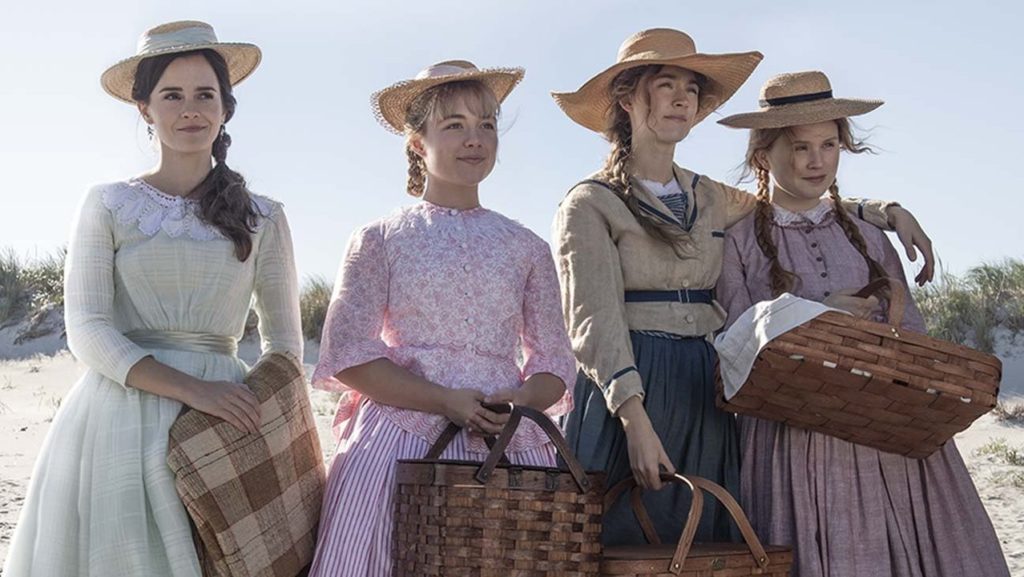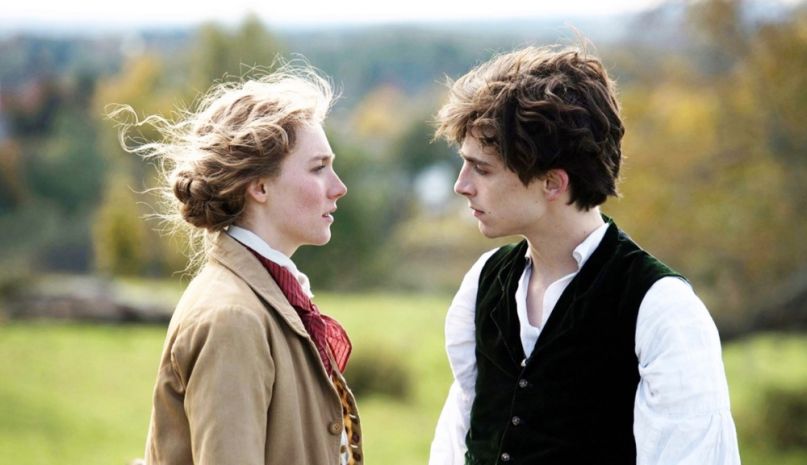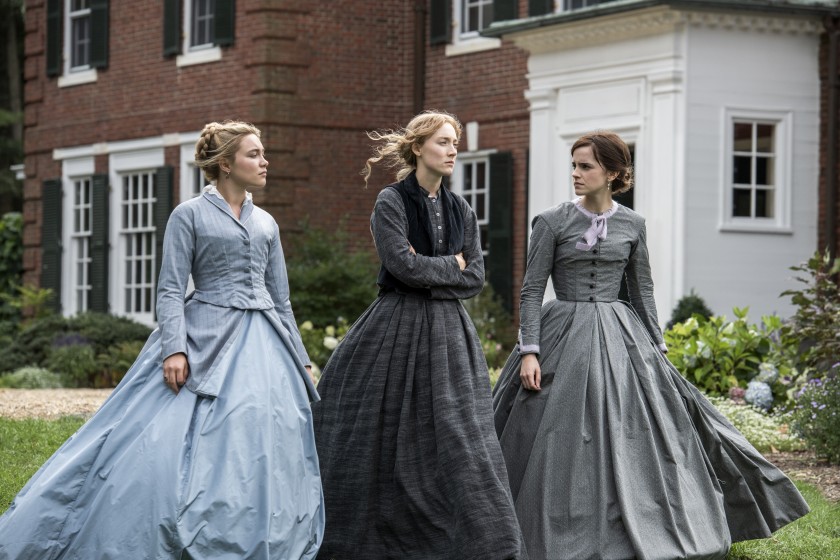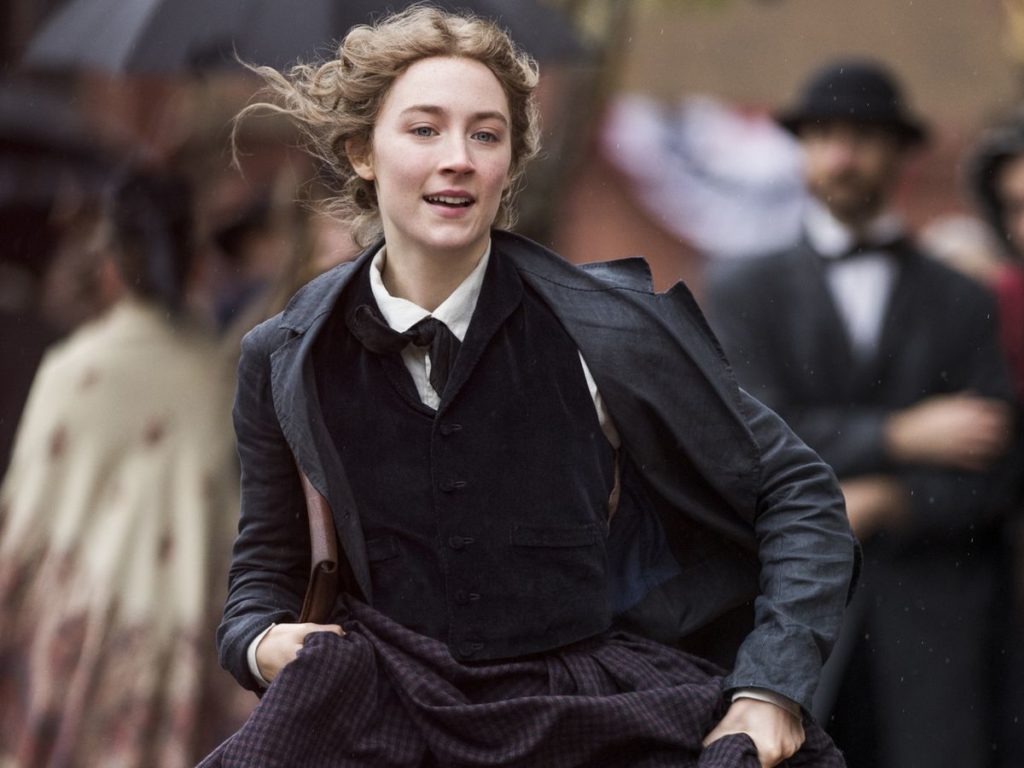
I keep thinking about the ink smudges. Greta Gerwig’s new adaptation of Little Women is a film of boundless beauty, full of ravishing sights and sounds: bright hoop dresses, handsome estates and gardens, Alexandre Desplat’s piano, Timothée Chalamet’s cheekbones, Saoirse Ronan’s eyes. But amid all of this delicate loveliness is a writer who cannot seem to scrub the stubborn streaks of pencil lead from her hands. The primary hero of Louisa May Alcott’s novel, Jo March is the perfect embodiment of Gerwig’s creative spirit—not just because she’s a talented and intelligent artist, but because her work seems to bleed with feeling. Little Women, Gerwig’s second feature following the lightning bolt that was Lady Bird, is a surpassingly elegant movie. It’s also stained with life.
Jo (Ronan), an amateur playwright and aspiring novelist, is one of four mostly grown sisters; the others (in descending order of age) are Meg (Emma Watson), Beth (Eliza Scanlen), and Amy (Florence Pugh). You probably already knew this, seeing as Alcott’s book is beloved, and has previously been transferred to the silver screen four times, with Jo being played by personalities as varied as Katharine Hepburn and Winona Ryder. And so, the question that initially hovers over this incarnation of Little Women—the same skeptical inquiry that lurks beneath any new adaptation of a repeatedly staged classic—is why it needed to be made, why it stands out. Several decades having passed since I’ve read the book or watched any of its prior re-imaginings, I am perhaps not the ideal critic to answer this question. But I have seen this one, and I can say with some confidence that you should herald its arrival not with cynicism but with gratitude. The reason to see Gerwig’s movie isn’t that it rejuvenates old tropes or interrogates long-held assumptions or introduces a literary landmark to a new generation, even if it may very well do all of those things. The reason to see it is that it’s wonderful.
It also demonstrates that surprise is not an essential ingredient of cinema. Much like a Shakespeare comedy or a police procedural, the broad narrative arc of Little Women smoothly follows a predetermined course. Jo will struggle to reconcile her inherent need for independence with the expectations of a patriarchal culture. She will also squabble with Amy, who at one point will perform an act of spiteful sabotage that threatens to rend their relationship beyond repair. (The film is far from scary, but its portrayal of an era when manuscripts couldn’t be backed up to the cloud may give writers nightmares.) Together, the two iron-willed sisters will form the vertices of a slanted love triangle, with Theodore “Laurie” Laurence (Chalamet) at its apex. Meg will spurn the opulence of high society and will instead choose a husband of modest means. Beth, a timid and frail teenager to begin with, will grow grievously ill.

That all of this is anticipated in no way dilutes its sensory pleasure or its emotional impact. Gerwig’s gift as a filmmaker is her ability to infuse familiar stories with sparks of wit, charm, and color. The plot of this Little Women is hardly incidental, but it is also secondary to the suppleness of its atmosphere and the charisma of its cast.
This isn’t to say the movie is entirely conventional. Gerwig’s deftest screenwriting stroke is her decision to cleave the picture into two timelines, each of which features its own conflicts and challenges. In the first, which begins in 1861, the four March sisters all live at home in Massachusetts, young and united and eager to take on the world. The second, set seven years later, finds them more scattered—Meg is now married, Jo is teaching in New York, Amy is studying painting with her aunt (Meryl Streep) in Paris—and these domestic and geographic separations suggest a slow fraying of familial bonds. The bifurcated structure is a nervy move that allows Gerwig to tangle up the film’s rich emotions, and to present a fuller, more authentic vision of womanhood where comedy and tragedy often exist side by side. She cuts between the two periods gracefully, allowing revelations in the present to give deeper meaning to the past; for example, we learn early on that Jo has declined Laurie’s proposal of marriage, a piece of information that shrouds their frolicsome quasi-courtship in disappointment and sadness. (I’ve heard rumblings that the dual chronology is disorienting, a complaint I find dubious; if you can unravel the multiple timelines of Westworld and The Witcher, you can surely grasp the back-and-forth depicted here, especially once Jo cuts off all her hair—a selfless gesture that prompts Amy to hilariously exclaim, “Your one beauty!”) Gerwig also boldly experiments with rhyming images and scenes, most notably with regard to Beth; she’s ailing in both episodes, and in the movie’s most wrenching sequence, Gerwig juxtaposes Jo twice sitting vigil at her sister’s bedside, culminating in two headlong rushes down the stairs—one leavened with relief, the other crippled with anguish.
Yet despite Beth’s maladies, the predominant mood of Little Women is one of unapologetic happiness. As she showcased in Lady Bird, Gerwig has a light touch with blocking and dialogue, and some of this film’s best scenes simply involve the four sisters cavorting in their home, engaging in pillow fights or rehearsing their performances for Jo’s latest play. This impression of buoyancy extends beyond the March household; it’s present when Beth ventures across the road to the manor of Laurie’s grandfather (a splendid Chris Cooper)—where she quietly luxuriates in her love of playing piano—and when Jo and Laurie first meet at a party—where they take solace in each other’s awkwardness and conspire to dance jubilantly and terribly. But the movie’s core is the sororal link between its titular heroines, and Gerwig and her actors—similar to what Ronan did in Brooklyn—together create a powerfully vibrant sisterhood, teeming with warmth, jealousy, anxiety, and love.

At the same time, the film simmers with a gentle but unmistakable undercurrent of feminist fury. “I’m angry nearly every day,” confesses Jo’s mother, Marmee (Laura Dern, offering a tender complement to her more fiery character in Marriage Story). And while Little Women is hardly a political screed, it bluntly tackles the systemic biases inflicted on the fairer sex, then and now. It’s possible to view this content through a meta lens, given the dearth of women who hold true power in Hollywood, whether behind a camera or a studio desk; certainly, Jo’s debates with a rumpled publisher (Tracy Letts, excellent as always) about the proper role of female characters in art bristle with contemporary relevance. But Gerwig is too empathetic a director to turn the March sisters into mere vessels for talking points. When Amy enlightens Laurie on an ugly truth—that for women, marriage is an economic proposition rather than a romantic one—she isn’t making an abstract speech; she’s lamenting how this world, with its heavy finery and gilded cages, invisibly suppresses her individual power of choice.
What a pretty world, though! Gerwig’s nimble craftsmanship risks minimizing her agile style, which is unshowy but highly immersive. Her contributors are all in top form; the costumes, by longtime Joe Wright collaborator Jacqueline Durran, pop with color and detail, while Desplat’s score, heavy on piano and woodwinds, is one of his most gorgeous. The camera, operated by Olivier Assayas regular Yorick Le Saux, is fluid and composed, occasionally locking onto an image of startling splendor, such as the faraway shot of a man on one knee in a courtyard, his unheard question freighted with significance.
But the real stars are, well, the stars. The cast of this Little Women is preposterously talented, and everyone is in fine form; Chalamet is ideally cast as a whimsical playboy, Watson is marvelously understated, and Scanlen—best known as Amy Adams’ half-sister on Sharp Objects, where she was a force of nature—is helpless but never pitiful. Still, just as the film’s central dramatic relationship is the one between Jo and Amy, its most moving performances come from Ronan and Pugh. The latter, in a role several thousand miles removed from her turn in Midsommar, imbues Amy with a capriciousness that camouflages her vulnerability; she’s the most maddening March, and also the one most capable of surprising you.

As for Ronan, I could tell you that she delivers a remarkable portrayal—one brimming with intuition and subtlety and grace—or I could just say that she supplies a garden-variety Saoirse Ronan performance; it amounts to the same thing. Still, it’s no easy thing to imperceptibly anchor a movie when you’re surrounded by so much star power, and Ronan never demands the spotlight, even if it invariably returns to her. She’s an incredibly astute actor, so what’s most striking here is her earthiness; when Jo shares a laugh with Meg or tells a story to Beth or (most memorably) lands a punch to Laurie’s arm, she does so with a sublime naturalism that seems divorced from technique. And when Gerwig finally affords Ronan a Big Moment—a scene with Dern where she rails against the artificial limitations placed on a woman’s future—she demolishes it, those porcelain-blue eyes blazing with heartache and passion and unconquerable pride.
The appeal of Jo March—the same qualities that lead her aunt to refer to her as a lost cause—is that she is a woman ahead of her time, and maybe ours as well. The societal commands that she chafes against—smarten up! marry well! be a dutiful wife!—may seem antiquated, but their underpinnings remain in a culture where women are constantly told that they’d get further in life if they’d just smile a little more. Yet while Little Women makes note of this inequality, it doesn’t belabor the point; it’s too busy diving into the bustling lives of its characters, breathing in their troubles and desires. This is a movie whose primary purpose is to bring its audience joy. Maybe that’s why, even if it first scans as a traditional period piece, Gerwig’s adaptation in fact plays out as a revitalizing change of pace. For once, women get to tell us to smile instead.
Grade: A-
Jeremy Beck is the editor-in-chief of MovieManifesto. He watches more movies and television than he probably should.

Exquisitely written review! Hugely enjoyable!